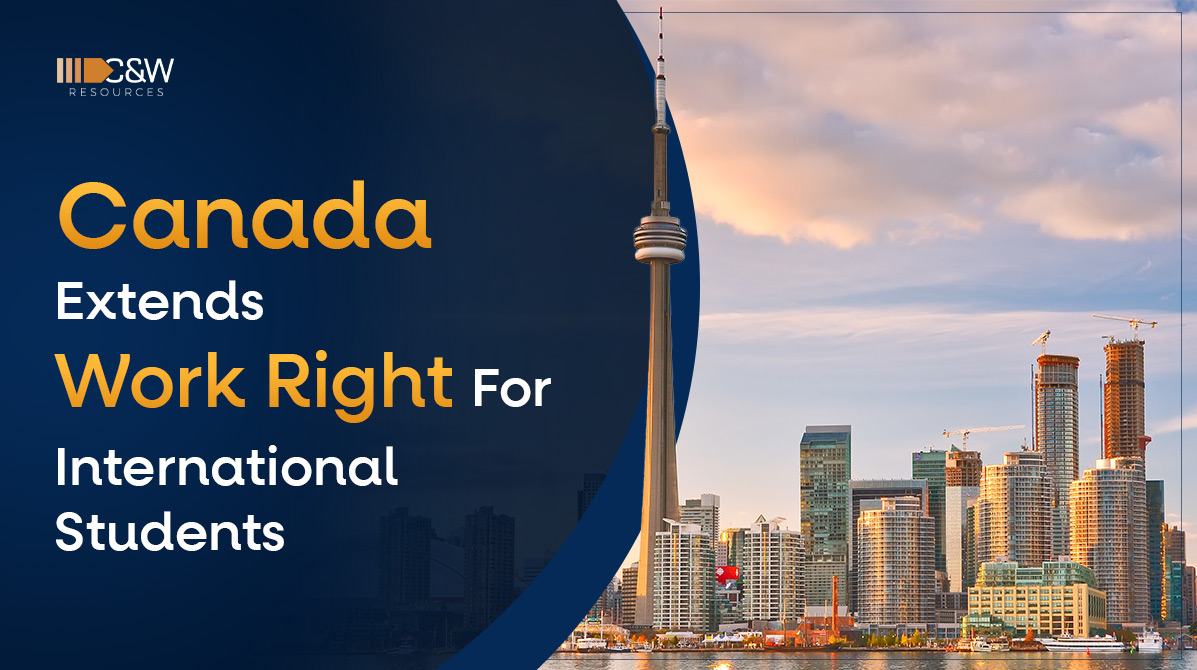
From Study to Work: Canada’s Extended Work Rights for International Students
On December 7, 2023, Minister Marc Miller, the esteemed representative of Immigration, Refugees and Citizenship Canada (IRCC), unveiled the latest pivotal updates poised to positively impact the international students currently studying or embarking on their educational journey in Canada. The policies are strategically devised to safeguard international students from the rapidly increasing cost of living and prevailing housing challenges that have recently surfaced.
Starting January 1, 2024, the amount required for a study permit application will significantly increase from C$10,000 to C$20,635. This change is necessary to keep up with the rising cost of living.
Furthermore, the exemptions on working hour limitations for overseas students, due to expire on December 31, have been extended until April 30, 2024. This allows students to work more than 20 hours a week off campus during the winter semester. Minister Miller also updated several interim measures concerning post-graduation employment permits, listed below.
Read further to learn how these changes may affect you as an international student, adviser, or recruitment partner.
Higher Cost-of-Living Financial Minimum for Students
The most significant statement in this batch is Canada’s altered requirements for proof of financial assistance on a student’s study visa application.
When international students apply for their Canadian study permit (a student visa), they must have access to a certain amount of funds, demonstrating that they are financially prepared to live and study in Canada. For the past several years, this price has been set at C$10,000 (plus travel expenses and the cost of one year’s tuition) for a single candidate. However, growing living costs have rendered this an impossibly low figure for students to plan around.
From now on, IRCC will enhance this financial requirement every year, depending on Statistics Canada’s most recent low-income cut-off. In 2024, a single candidate must have access to C$20,635 and sufficient finances to cover travel fees and the cost of their first full year of tuition.
As of January 1, 2024, this increased minimum sum will apply to all new study permit applications. This change also applies to students applying through Canada’s Student Direct Stream, which requires them to produce proof of financial assistance through a Guaranteed Investment Certificate (GIC). GIC amounts must now be at least C$20,635 rather than the former C$10,000 minimum.
Working Hours Limit Waiver Extended to April
Although Minister Miller’s announcement centred on the increased financial obligation, he also offered timely updates on a few other temporary student-facing initiatives.
In the fall of 2022, IRCC stated that international students with off-campus work permission on their study visa will be permitted to work off-campus for more than 20 hours per week during their studies beginning November 15, 2022, and continuing until 2023.
This temporary waiver was supposed to conclude on December 31, 2023. However, it has already been extended until April 30, 2024. This extension applies to current international students in Canada and new candidates who have filed their study visa application by December 7, 2023.
This work-hours exemption has benefited overseas students in a variety of ways. They now have more freedom to pick their working hours, can graduate with more job experience, and can earn more money to help fund their education.
Even though the extension only lasts until the end of April, Minister Miller did not exclude permanently extending the working hours cap to 30 hours per week. According to the official press release:
“We continue to examine options for this policy in the future, such as expanding off-campus work hours for international students to 30 hours per week while class is in session.”
A Few Post-Graduation Work Permit Updates
Due to the considerable adjustments and movement limitations created by the global COVID-19 epidemic, the Canadian government has implemented temporary revisions to its popular Post-Graduation Work Permit (PGWP) Programme in recent years.
One of these solutions permitted overseas students to study remotely online rather than in Canada but still accumulate study hours towards a future PGWP (up to 50% of the programme). Today, IRCC confirmed that this policy will stay in force for any students who commence a Canadian study programme before September 1, 2024—the final deadline for students to benefit from this one-of-a-kind regulation.
In addition, because of the pandemic, Canada has already announced extensions for qualified PGWP holders who could not fully utilise their PGWP after graduation. These PGWP holders were allowed to get work experience in Canada thanks to an extra work permit. Minister Miller said today that people with PGWPs that expire before the end of 2023 are still eligible for the extension but that the scheme would not be extended further.
These IRCC updates ensure international students are prepared for success while studying, working, and living in Canada. ApplyBoard is pleased to see the Canadian government addressing many of the recent problems raised by overseas students.
We hope that by 2024, even more steps will be taken to appropriately support and assist the well-being of international students in Canada.
The most recent information may be found on the news page of the IRCC website.
Recent Posts
- The Cheapest Postgraduate Courses in the UK for International Students
- Guide to 2024 German Masters Scholarships for Pakistani Students
- Statement of Purpose for a Scholarship: A Guide to Success
- Can I study in the UK after matric from Pakistan? Complete Guide
- Best Country for MBBS for Pakistani Students




